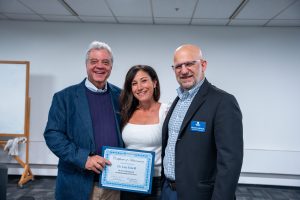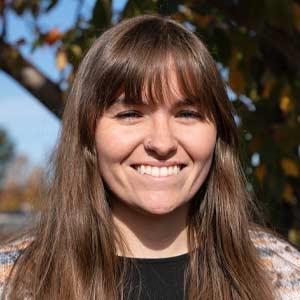Gone is the stereotype of the wide-eyed teenager clutching a backpack while navigating a new and unchartered campus. With the concept of “age-friendly” universities gaining traction, colleges are increasingly recognizing the value of lifelong learning and working to become a more accessible haven for students of all ages.
The official age-friendly designation signifies a commitment to fostering a welcoming and inclusive environment for students at every phase of life, most specifically those returning to school later. By offering targeted programs, supportive resources, and a physically accessible campus, age-friendly colleges are redefining the traditional college experience, opening doors to a wealth of knowledge and engagement for a broader student population. Roughly 100 universities globally boast this designation, and many more are actively working toward it.
Take Goodwin University, for example. Committed to shattering the mold of the traditional college experience, Goodwin is actively cultivating an inclusive environment where students of all ages feel welcome and supported. Recognizing the value of lifelong learning, we’re currently working towards receiving an official age-friendly designation. This dedication will help ensure a welcoming atmosphere for those returning to school later in life, alongside their younger counterparts.

Lisa Fanelli, Program Director of Health Science & Public Health, is a leading advocate for this movement. She believes that education should be accessible to everyone, regardless of age. With 26 years of experience as an occupational therapist, Lisa has dedicated her career to supporting older adults. Her commitment to this cause is evident in her active efforts to obtain the official age-friendly designation for Goodwin.
The journey toward an age-friendly designation
What constitutes “old age”? The Age-Friendly University Global Network uses a combined definition of aging, informed by the World Health Organization and the United Nations, as follows:
“The concept of “old age” is multidimensional, which includes chronological (based on a birthdate), biological (related to human body ability), psychological (concerned with psycho-emotional functioning), and social age (related to social roles).”
If an institution is interested in receiving an age-friendly designation, they must first undergo a comprehensive application process, which involves adopting the correct principles to support educational accessibility for all ages.
There are ten principles necessary to officially become an age-friendly university. These principles ensure that the respective school is practicing inclusivity in numerous ways by recognizing the educational needs of older students. Institutional applicants must meet at least four of the respective principles in order to be eligible for an endorsement.
The endorsement process is broken up into three concrete steps:
- Develop an age-friendly university working group and identify your age-friendly university champions.
- Arrange a meeting with the appropriate member of your university administration (e.g., chancellor, provost, president) who would approve your institutional endorsement.
- Complete the age-friendly university application. Then, your age-friendly champion will submit your application to the Global Network.
The entire application process can take anywhere from three to twelve months. Please refer to the guidebook for specific information on acquiring this designation.
Your future starts here. Apply to Goodwin University today to be a part of our age-friendly vision!
Challenges faced by older populations in higher education
Older populations in higher education often encounter unique challenges that can hinder their academic success and overall experience. One significant hurdle is the rapid pace of technological advancements, which can be daunting for those who did not grow up with the same digital fluency as younger generations. This divide can make it difficult for older students to navigate online learning platforms, access resources, or engage in virtual classroom activities.
Additionally, a lack of support services, such as academic advising and career counseling specifically designed for older students, can leave them feeling isolated. The social aspect of returning to school can also be intimidating, as older students may struggle to find peers with similar life experiences and interests. Addressing these challenges is crucial for creating an inclusive and supportive educational environment that fosters success for students of all ages.
Goodwin’s noble movement for inclusivity
Goodwin is one of the universities at the helm of this movement, currently working to receive an official designation. Goodwin’s pursuit of an age-friendly designation exemplifies its dedication to fostering a more inclusive educational landscape.
“It embraces the philosophy of lifelong learning and demystifies or debunks the myths [surrounding] the aging process to college students who have a different view of aging,” says Fanelli on how the official designation can spark change in higher education.
Goodwin is home to several committees of faculty members and administrators who are also interested in cementing this designation. These committees are devoted to actively putting the age-friendly principles into place. An example of this is the Instructional Design Team, who is currently working to implement a plan that assists nontraditional college students in navigating an online learning environment. Goodwin’s Career Services department is also in support of this mission and has been creating webinars for older adults focused on which programs and certificates may be beneficial for their particular needs.
Benefits of age inclusivity
It’s also important to note that age-friendly education benefits everybody involved, not just the respective older students. One of the most thrilling aspects of age-friendly education is what other students can also gain from it. Fanelli highlights that the greatest benefit is the “wisdom” older adults bring. “There are numerous opportunities for real-life experiences to be shared in the classroom, whether through guest lectures by older adults or through learning alongside them. This allows students to tap into the valuable personal and professional insights they offer,” she explains.
By proactively addressing the unique needs of students across the age spectrum, from inclusive support services to a physically accessible campus, Goodwin is not only challenging conventional norms but also paving the way for a more equitable learning environment. This commitment reflects a broader recognition of the value of lifelong learning and aims to ensure that students, whether returning later in life or just beginning their educational journey, are met with a supportive atmosphere. Goodwin University’s efforts serve as a model for other institutions aspiring to embrace diversity in age and create a more inclusive academic community for all learners.
Interested in becoming a part of our age-friendly community? Apply to Goodwin University today and get a jumpstart on your future!

Grace Kuraska is a marketing content writer at Goodwin University where she combines her passion for creativity and storytelling to craft engaging content that resonates with readers. She graduated from University of Connecticut, where she earned her bachelor’s degree in English with a minor in Sociology. Grace brings years of experience in writing, editing, and proofreading to craft compelling narratives that connect with audiences and inspire action.

